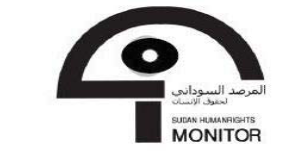1-January- 2024
The human rights situation in Sudan deteriorated to a devastating level, as the war between Sudanese Armed Forces (SAF) and Rapid Support Forces (RSF) entered its ninth month. The RSF gained control over Wad Madani, capital of Gezira State, and its environs, while both factions persisted in combat across Darfur, Western Sudan. The situation of civilians worsened as a result of the intensification of military operations. On December 29th, SAF indiscriminately bombed the densely populated city of Nyala with explosive barrels. Eyewitnesses and human rights organizations reported the killing and injury of 118 civilians in the attack. At the same time, sporadic attacks continued in the villages and towns of Gezira State, with the aim of looting, where several incidents of killing against civilians took place. In SAF-controlled areas, SAF military intelligence continued to target political activists, relief volunteers, and human rights defenders in various Sudanese cities. Moreover, extrajudicial killings took the lives of many citizens in different cities under the pretext of cooperating with the RSF. It is also evident that the infrastructure in Khartoum in particular suffered irreparable damage. The SHRM stresses the imperative need to cease the war immediately and protect civilians from its devastating impacts. The continuation of the war in Sudan has shed the blood, displaced, and impoverished civilians while also destroying their social fabric, and suppressing their aspirations for peace, freedom, and justice. The April 15th war has turned into a war waged primarily by both sides against civilians.
The Armed Conflict Locations and Events Data Project recorded over 3,250 military battles and more than 12,190 killings in Sudan by early December 2023 since the war’s outbreak on April 15th. Most of these killings are among civilians. The figures recorded give an average death toll of four victims, most of them are civilians, in every battle fought by both sides of the war. Moreover, the United Nations Office for the Coordination of Humanitarian Affairs confirmed in December the displacement of over 6.9 million people inside and outside Sudan since the outbreak of war, with approximately 17.7 million people facing severe food insecurity.
Systematic targeting of civilians, civilian objects, and citizens’ property throughout Sudan
In November, the RSF took control of most of Darfur and assumed de facto authority over the region with the exception of its capital, El Fasher. The RSF and its allied militias inflicted havoc and destruction in Darfur, a region that continued to suffer since 2003. The gravest violations and crimes committed include killing of hundreds of civilians and displacing hundreds of thousands from West Darfur State, in mid-year. Overall, RSF and its allied militias committed numerous large-scale crimes in West Darfur, some of which amount to ethnic cleansing and genocide. On December 29th, SAF committed a massacre in the city of Nyala, South Darfur State, by launching indiscriminate bombardment of explosive barrels which led to killing dozens of people, most of them are civilians. Moreover, numerous cases of rape committed by RSF have been observed in Khartoum, Darfur, South Kordofan, and recently in Gezira State, in addition to threats of rape as away of blackmail and intimidation. Rape crimes fall within crimes against humanity that place their perpetrators under international humanitarian law.
In the capital, Khartoum, infrastructure was targeted. on November 11th, Shambat Bridge was bombed. The bridge provided vital access for the residents of the capital before the war. During the conflict the bridge was used by the RSF to connect the cities of Omdurman and Khartoum Bahri. In light of the mutual accusations between the warring parties, it is evident that the party that bombed the bridge targeted a civilian target, a violation of international humanitarian law. on November 18th, in the Southwest of Khartoum, the Jabal Awliya Bridge on the White Nile River was also bombed. Until the time of releasing this statement, SAF have not issued a statement clarifying their responsibility or lack thereof in bombing these facilities. Rather, conflicting statements have been issued by both parties, each attributing responsibility to the other party.
The systematic targeting of civilians and their properties in Gezira State continued after its capture by RSF in mid-December. According to United Nations reports over 300,000 people were displaced. The state witnessed numerous violations, including killing and assaulting citizens’ homes in the greater city of Wad Madani, intimidating residents, threatening their lives, and seizing their cars, money, and property, as well as looting markets, warehouses, and businesses facilities, including the warehouses of the United Nations World Food Program (WFP). Despite the pledge of the (RSF) leadership at the highest level to protect civilians and return stolen items and goods, especially cars, looting and intimidation activities persisted all through Gezira State without deterrence. The failure of RSF leaders to fulfill their promises indicates either the leadership’s inability to control its forces, or its lack of seriousness in the pledges made to the people.
On December 24th, RSF entered Umm Dagarsi, a village located in the Northern part of Gezira State, searching for cars buried near the Blue Nile, arresting, and torturing four residents. In response, the residents gathered to stop this violation. RSF opened fire on civilians, killing five and leaving many wounded. Villages were repeatedly attacked, and citizens’ cars were stolen, especially along the highway extending from Madani to Southern Sennar, and the Western highway between Madani and Khartoum. On the night of December 30th, most of Al-Madeena Arab residents were forced to leave their homes following the killing of three shop owners in the town market, as well as a doctor who was on his way back from work at the hands of forces that citizen testimonies confirmed belong to RSF.
Systematic targeting of human rights defenders and peace advocates
Through its monitoring of the arrest campaigns carried out by SAF military intelligence in many states, the Sudanese Observatory for Human Rights confirmed the systematic targeting of human rights defenders, political activists, and members of resistance committees in areas controlled by SAF. For example, Ahmed Abu Hurairah Hassan (29 years), a leading member of the Liberal Democratic Party which is a member party of the Forces for Freedom and Change, was arrested by SAF military intelligence on July 9th, 2023, in the vicinity of the city of Shendi in the Nile River State. His place of detention remains unknown. On December 27th, SAF military intelligence in Sennar State carried out arrest campaigns in Karkoug Administrative Unit and Dontai, arresting eleven people affiliated with political and civil forces and resistance committees, according to the Karkoug Resistance Committees in Sennar State. SAF military intelligence in Singa also arrested a number of emergency room volunteers while they were providing meals to displaced people passing through the town’ market. On May 14th, SAF military intelligence also arrested Amer Abboud and Mujahid Anwar, two volunteers in the Bahri emergency rooms, in Kadru, Khartoum North. There is fear for the lives of these detainees, especially after the statement of the Nile River Governor, Muhammad al-Badawi, on December 29th, which gave members of the Forces of Freedom and Change 72 hours to leave the state. In a number Northern and Eastern states, campaigns of racist attacks and hate speech have escalated on regional and ethnic grounds, which threatens to turn the ongoing conflict into a full-blown civil war.
Recommendations
- The ongoing war must be stopped immediately and a peaceful solution to the Sudanese crisis must be found.
- The two warring parties must fully adhere to the rules of international humanitarian law and human rights laws, hold accountable and punish the perpetrators of violations, including soldiers and field commanders, and declare their readiness to fully cooperate with all parties investigating allegations of violations, most notably the fact-finding mission formed by the United Nations Human Rights Council, and the International Criminal Court.
- Rapid Support Forces must immediately stop attacking safe cities and villages, withdraw from those they occupied, and stop expanding the war.
- Rapid Support Forces must fully commit to controlling their forces in all areas of their deployment, especially Gezira State, and investigate the numerous attacks that occurred against civilians. Sudanese Armed Forces must investigate all allegations of torture, ill-treatment, and killings in custody, and take measures to bring suspected perpetrators to justice in fair trials.
- Sudanese Armed Forces must commit to stopping indiscriminate aerial bombardment, and refraining from using explosive barrels, especially in the cities of Darfur, Khartoum, and all civilian-populated areas, and allowing relief workers safe access to the victims of aerial bombardment and other civilians in all areas of Darfur, especially Nyala.
- Both warring parties must refrain from any action that would further complicate an already dire food insecurity situation, including plundering relief stocks, obstructing their arrival, controlling their route, stealing crops, or attacking relief workers. Such actions are considered clear violations of international humanitarian law.
- Both warring parties must completely refrain from arming civilians due to the dangers and dire consequences entailed including putting the country on the brink of a full-blown civil war.
For more information: info@suhrm.org
SUHRM website: https://www.suhrm.org/

